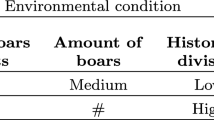Abstract
Human interaction is a natural process in business management. In various indigenous cultures, the natives still use a barter system to reach consensus or balances that determine the essence of their economies. The present investigation consists of the presentation of an unsupervised model based on pure barter. The main contribution sought is to visualize the balance that is achieved in an unsupervised environment of two entities that are close to reaching an agreement. Both Game Theory and Walrasian Theory deal with the problem of exchange of goods. However, the current objective is to show the barter model from its simplest bases for the construction of an unsupervised automatic learning scheme where a system of pairs of agents represent a basic model for decision making when guaranteeing an agreement.
Access this chapter
Tax calculation will be finalised at checkout
Purchases are for personal use only
Similar content being viewed by others
References
Svizzero, S., Tisdell, C.: Barter and the origin of money and some insights from the ancient palatial economies of mesopotamia and Egypt (2019)
Jia, D.L..: Dynamic Macroeconomic Models in Emerging Market Economies: DSGE Modelling with Financial and Housing Sectors. Springer, Heidelberg (2020). https://doi.org/10.1007/978-981-15-4588-7
Missos, V.: Mathematical analysis as a source of mainstream economic ideology. Econ. Thought 9(1), 72–95 (2020)
Rockafellar, R.T.: Optimization and decentralization in the mathematics of economic equilibrium. other words 1, 1–4 (2020)
Hua, G., et al.: The newsvendor problem with barter exchange. Omega 92, 102149 (2020). https://doi.org/10.1016/j.omega.2019.102149
Dutta, C., Singh, R., Garg, K., Choudhury, T.: Modern day approach for buying and selling needs with the use of information technology: A barter system. J. Crit. Rev. 7(12), 1451–1457 (2020)
Zheng, Y., Yang, T., Zhang, W., Zhao, D.: Barter Exchange via Friends’ Friends. arXiv:201004933 [cs] (2020)
Dubovikov, M.: Mathematical model of modern economy. Handel Wewnętrzny 352(5), 13–24 (2014)
Taskinsoy, J.: From Primitive Barter to Inflationary Dollar: A Warless Economic Weapon of Mass Destruction. Available at SSRN 3542145 (2020). https://doi.org/10.2139/ssrn.3542145
Köster, R., et al.: Model-free conventions in multi-agent reinforcement learning with heterogeneous preferences. arXiv preprint arXiv:2010.09054 (2020)
Espinel, R.: Las matemáticas simples del equilibrio general. Matemática 2(2) (2020)
Mas-Colell, A., Whinston, M.D., Green, J.R.: Microeconomic Theory, vol. 1. Oxford University Press, New York(1995).
Stone, M.H.: The generalized Weierstrass approximation theorem. Math. Mag. 21, 237–254 (1948). https://doi.org/10.2307/3029337
Hands, D.W.: Derivational robustness, credible substitute systems and mathematical economic models: The case of stability analysis in Walrasian general equilibrium theory. Eur. J. Philos. Sci. 6(1), 31–53 (2015). https://doi.org/10.1007/s13194-015-0130-0
Zhang, W.-B.: A Simple Growth model based on neoclassical growth, monopolistic competition, and Walrasian general equilibrium theories. Int. J. Acad. Res. Bus. Soc. Sci. 9(3) (2019). https://doi.org/10.6007/IJARBSS/v9-i3/5758
Deride, J., Jofré, A., Wets, R.-B.: Solving Deterministic and Stochastic Equilibrium Problems via Augmented Walrasian. Comput. Econ. 53(1), 315–342 (2017). https://doi.org/10.1007/s10614-017-9733-1
Lahkar, R.: Convergence to Walrasian equilibrium with minimal information. J. Econ. Interac. Coord. 15(3), 553–578 (2019). https://doi.org/10.1007/s11403-019-00243-8
Loch-Temzelides, T.: Walrasian Equilibrium Behavior in Nature (2020)
Rubin, G.: Oskar Lange and the Walrasian interpretation of IS-LM. J Hist Econ Thought 38(3), 285–309 (2016). https://doi.org/10.1017/S1053837216000341
Zhang, B., Wei, L., Chen, M.: Implications of Barter Exchange and Decision Biases in a Pull Contract. Available at SSRN 3596186 (2020)
Molina-Jimenez, C., Nakib HDA, Song L, et al.: A Case for a Currencyless Economy Based on Bartering with Smart Contracts. arXiv:201007013 [cs] (2020)
Asici, T.Z., Tezel, B.T., Kardas, G.: On the use of the analytic hierarchy process in the evaluation of domain-specific modeling languages for multi-agent systems. Journal of Computer Languages 62, 101020 (2021). https://doi.org/10.1016/j.cola.2020.101020
Drummond, T.: Exploring the Sharing Economy in Economically Distressed Environments (2020)
Mehri Arsoon, M., Moghaddas-Tafreshi, S.M.: Peer-to-peer energy bartering for the resilience response enhancement of networked microgrids. Appl. Energy 261, 114413 (2020). https://doi.org/10.1016/j.apenergy.2019.114413
Ozturan, C.: Barter Machine: An Autonomous, Distributed Barter Exchange on the Ethereum Blockchain. Ledger, 5 (2020). https://doi.org/10.5195/ledger.2020.148
Bigoni, M., Camera, G., Casari, M.: Cooperation among strangers with and without a monetary system. In: Handbook of Experimental Game Theory. Edward Elgar Publishing, pp 213–240 (2020)
Kelejnikova, S., Shlapakova, N., Samygin, D.: Model of Decision Support on Regulation of the Vegetable Market. IOP Conference Series: Materials Science and Engineering 753(5), 052051 (2020). https://doi.org/10.1088/1757-899X/753/5/052051
Sankar, C.P., Thumba, D.A., Ramamohan, T.R., Chandra, S.S.V., Satheesh Kumar, K.: Agent-based multi-edge network simulation model for knowledge diffusion through board interlocks. Expert Systems with Applications 141, 112962 (2020). https://doi.org/10.1016/j.eswa.2019.112962
Acknowledgment
The authors are greatly grateful by the support given by the SDAS Research Group (www.sdas-group.com). As well, acknowledge to the project "Development of new mathematical models and methods for decision making" of the Department of Mathematics and Computation of the University of Havana.
Author information
Authors and Affiliations
Corresponding author
Editor information
Editors and Affiliations
Rights and permissions
Copyright information
© 2021 Springer Nature Singapore Pte Ltd.
About this paper
Cite this paper
Fernández-Fernández, Y., Lorente-Leyva, L.L., Peluffo-Ordóñez, D.H., Pérez, R.M., Álvarez, E.N.C. (2021). Unsupervised Barter Model Based on Natural Human Interaction. In: Hong, TP., Wojtkiewicz, K., Chawuthai, R., Sitek, P. (eds) Recent Challenges in Intelligent Information and Database Systems. ACIIDS 2021. Communications in Computer and Information Science, vol 1371. Springer, Singapore. https://doi.org/10.1007/978-981-16-1685-3_32
Download citation
DOI: https://doi.org/10.1007/978-981-16-1685-3_32
Published:
Publisher Name: Springer, Singapore
Print ISBN: 978-981-16-1684-6
Online ISBN: 978-981-16-1685-3
eBook Packages: Computer ScienceComputer Science (R0)




